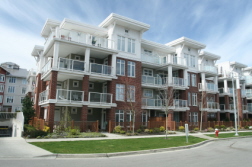|
San Diego, CA: The thrust and intent behind home warranty insurance is to protect the parties involved from defects in workmanship and materials. New construction is usually accompanied by coverage warranting against defects from initial occupation until an agreed period of termination, at which time many homeowners will seek out home warranty companies vending extended warranty coverage, should hidden defects come to the fore later in a structure’s initial life cycle.
|
 Sometimes a homeowner will suffer a case of bad faith insurance when a provider attempts to stonewall or renege on contractual obligations. However, insurance headaches are not necessarily restricted to single-family homes. In San Diego, California, a 66-unit condominium and common-areas project located in the downtown lay at the center of an insurance dispute.According to court documents, Centex Homes is the developer of record for the complex, which, according to a complaint filed by a homeowners’ association, carries alleged building defects. The association filed a home warranty lawsuit alleging violations of building standards, breaches of fiduciary duties and implied warranty, negligence and strict liability. The plaintiffs are seeking more than $22 million in damages and compensation, according to court records.
Sometimes a homeowner will suffer a case of bad faith insurance when a provider attempts to stonewall or renege on contractual obligations. However, insurance headaches are not necessarily restricted to single-family homes. In San Diego, California, a 66-unit condominium and common-areas project located in the downtown lay at the center of an insurance dispute.According to court documents, Centex Homes is the developer of record for the complex, which, according to a complaint filed by a homeowners’ association, carries alleged building defects. The association filed a home warranty lawsuit alleging violations of building standards, breaches of fiduciary duties and implied warranty, negligence and strict liability. The plaintiffs are seeking more than $22 million in damages and compensation, according to court records.
At the center of the dispute is a claim by The Insurance Co. of the State of Pennsylvania (ISOP) that it has no duty to indemnify Centex over the alleged defects due to the fact provisions contained in an underlying liability policy provided by Lexington Insurance Co., together with provisions associated with other underlying insurance, have yet to be exhausted.
Centex doesn’t agree, and feels ISOP should come to the party. For its part, Centex filed a motion with the Court January 3 of this year to either stay the litigation or dismiss the lawsuit altogether. The thinking of the defendant is that ISOP, the insurer of record, follows the terms in the underlying Lexington policy, which requires contractually that disputes over policy interpretations be settled in arbitration.
Thus, Centex wants the bad faith insurance litigation stayed or tossed. Failing that, the defendant wants the proceedings transferred to the Northern District of Texas, given that the parties involved had already selected Dallas as the forum for arbitration, if necessary.
The report did not confirm or identify the specific construction defects involved, as so alleged. And while jurisdictional arguments are hammered out, residents of the complex are left to wait and wonder as to their fate and that of their residences.
READ MORE HOME WARRANTY INSURANCE LEGAL NEWS
Insurance companies, either serving as an immediate indemnifier or in kind as an extended warranty provider, are usually happy to collect monthly premiums, but prefer not to pay out claims until all avenues for delay and potential dismissal are exhausted. It is unclear what provides the motivation in this case, and whether or not this insurance claim denied is a case of bad faith insurance or simply a case of the need for wading through all necessary legal arguments.
Regardless, plaintiffs have no choice but to wait and deal with alleged construction defects, until the day when all this gets sorted out.
